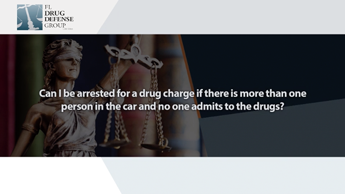Tampering With Evidence In Florida Drug Cases

In terms of legal consequences, there is a big difference between getting convicted of drug possession and getting convicted of drug trafficking or any of the other crimes that indicate that you were participating in other people’s drug use instead of just your own. Much of what determines which drug crime you get charged with depends on the interpretation of evidence. It is possible for the prosecution to convince the jury, beyond a reasonable doubt, that you sold drugs even if none of the witnesses claimed to have bought drugs from you and if no one testified that they saw you take a stack of banknotes from someone and hand them a bag of drugs. Likewise, you can be convicted of possession with intent to deliver just because the quantity of drugs in your apartment was larger than what the prosecution considers a reasonable quantity for one person to consume, even if you planned to consume them all by yourself over time. Therefore, it is understandable to want to make the evidence appear that you did not sell or attempt to sell drugs, but if you discard, alter, or plant evidence, you can get an additional charge for tampering with evidence. If you are facing charges for tampering with evidence in connection to a drug case, contact a Central Florida drug crimes defense lawyer.
Florida Tampering With Evidence Law
Florida Statutes Title XLVII Chapter 918.13 defines the crime of tampering with evidence as destroying, altering, removing, or concealing any object or document relevant to an ongoing or impending criminal investigation. Tampering with evidence is a third-degree felony, meaning that the maximum sentence is a $5,000 fine plus five years in prison and then five years of probation.
The following are examples of actions that could result in charges of tampering with evidence in a drug case:
- Deleting the apps from your phone that you used to communicate with drug dealers and buyers
- Dumping your stash of drugs and the computer with files related to your drug transactions into the Kissimmee River
- Throwing away your drug paraphernalia in your neighbor’s trash can or in your ex-girlfriend’s trash can instead of your own
In the last example, not only is the defendant trying to conceal evidence of his own guilt, but he is also trying to make someone else look guilty. In some cases, the court bases its decision of whether to release you on bail pending your trial on the risk that you will try to tamper with evidence; in one Florida case, the judge revoked bail for a defendant when the judge found out that, in a recorded phone call from jail, the defendant had instructed his girlfriend to throw away a computer hard drive that contained evidence related to the alleged crime.
Contact Us Today for Help
A Florida drug offense lawyer can help you if you are being accused of tampering with the evidence in a drug case against you or against someone you know. Contact FL Drug Defense Group for help.
Resource:
leg.state.fl.us/statutes/index.cfm?App_mode=Display_Statute&URL=0900-0999/0918/Sections/0918.13.html







